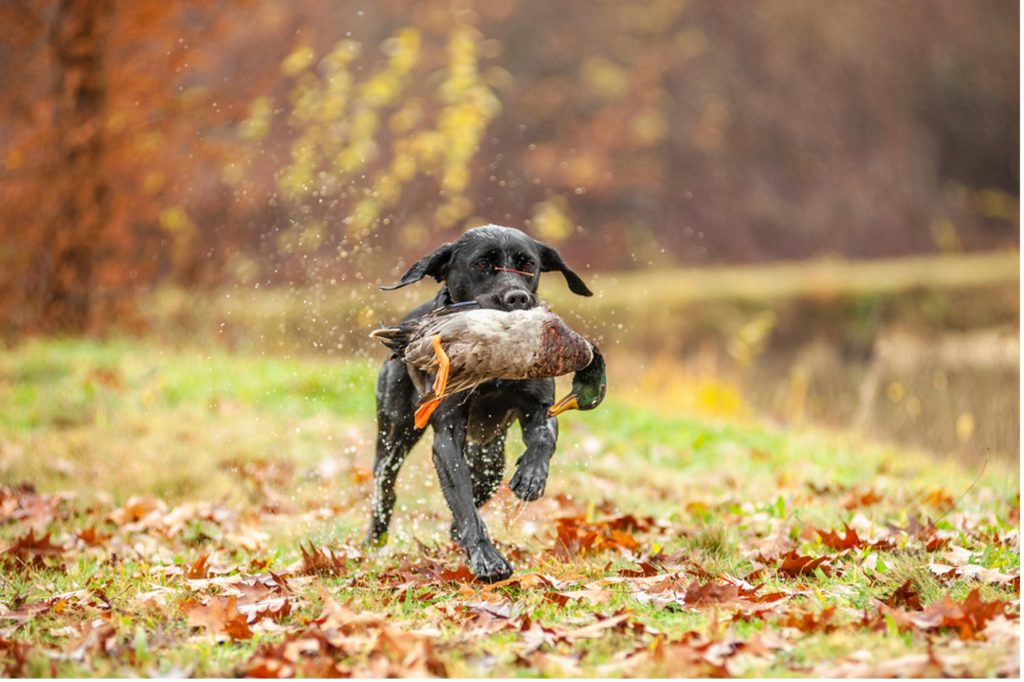Humans and dogs go a long way back. Research indicates that humans used dogs as guards and to aid in hunting some 12,000 years ago.
Crossbreeding of dogs began 9,000 years ago, which resulted in herd dogs. The evolution of dogs is a story of human evolution since the two species developed together. Once hunters and gatherers discovered farming and settled in communities, the role of dogs also altered.
Luckily, there are many different breeds of dogs. Each breed is unique and special in its manner. Some breeds make great herd dogs; others are excellent at guarding the house. Similarly, there are breeds of dogs that are suited for hunting.
Hunting Dog Training: An Overview
Hunting dogs are unique in their ability to aid in tracking, following, and retrieving prey, making them a perfect companion for hunting expeditions. They have elevated senses, like the ability to pick on a scent and lead the way following the smell, that allow them to hunt effectively.

Popular hunting dog breeds include Golden Retrievers, Labrador Retrievers, Bloodhounds, Beagles, American Foxhounds, English Pointers, and Chesapeake Bay Retrievers.
Each breed of hunting dog has characteristics that make them good hunting companions. The Golden Retriever, for example, can pick up and bring over game without damaging it. They have a soft mouth that enables them to pick up an animal with its mouth carefully.
Similarly, Bloodhounds excel in tracking. Their keen sense of smell means they can pick up on the faintest smell and lead the way.
Tips For Training Hunting Dogs
Hunting dogs’ training begins well before you start taking them out for a hunt. Here is the best way to proceed while training your hunting dog:
Obedience Training
Teaching your dog to be obedient is a fundamental part of training. Before you take your dog outside and familiarize them with the area and hunt, ensure it responds to commands instantly.
There are several reasons why obedience matters. Primarily, obedience allows your dog to focus. Going for a hunt can be overwhelming for your dog initially. Many different stimuli may make your dog distracted and unable to perform effectively. Dogs with perfect obedience and discipline can hunt well as they listen to and follow commands. They remain focused on the hunt.
It is also essential for your dog’s safety. Chances are that your dog may encounter dangerous situations during hunting. With the right commands, you can guide your dog toward safety. Obedience can be a lifesaver for your dog.
The good news is that most hunting dog breeds are known for being docile and obedient. This takes us to the next step of training your hunting dog, teaching them basic hunting commands.
Teaching Basic Hunting Commands
Commands are taught so you can effectively communicate with your dog. Using commands, you can let your dog know what you want your dog to do and how to behave.
Commands useful for hunting dogs include; ‘stay,’ ‘follow,’ and ‘retrieve.’ You can add your own depending on the type of hunt. The point is that your dog must understand and follow what you need them to do.
The most effective way to teach commands is using positive reinforcement. Reward your dog every time they follow a command. It does not always have to be a treat; you can reward them with appreciation or affection.
It is not simply that your dog can follow commands but also follow them correctly. Further training is needed if your dog is not retrieving game correctly or damaging it.
Social Integration
Hunting dogs are not just there to of you with hunting. They should be trained on how to behave socially.
Your dog must be comfortable around other people and pets. During a hunt, their senses are elevated, and their guard is high. If your dog views every social interaction as a hunt, it will be exhausting and counterproductive.
Hunting dogs must be trained to differentiate between a hunt and a normal social setting. Being social increases your dog’s confidence and enables them to act appropriately in different social situations.
Allowing your dog to be social is necessary for their mental and physical development. This is why it is important that your dog goes out and specializes.
Restraint
Knowing when and how to hunt is as important as knowing when to stop. Hunting dogs need to relax and re-energize.
Teach your dog to recognize its physical limits so they do not go beyond that. As an owner, you are responsible for ensuring that your dog is never pushed beyond their abilities.
Pamper your pet after a hunt. Massage them and give them time to rest. You can get this excellent dog detangler spray to comb their fur and massage them using a brush. Not only does brushing regularly helps to keep your dog well-groomed, but it also softens the muscles and relaxes their body.
Being Near Guns
If you are hunting with guns, you must allow your dog time to get used to them. Guns are loud and can prove scary for dogs. Slow exposure to guns is a great way to familiarize your dog.
As they get used to guns, the sound of gunfire becomes a signal that indicates that an animal has been shot. Your dog will run toward the gunshot to retrieve the target. The idea is not to startle or scare your dog at first.
Effective Training for Hunting Dogs
Training is a basic part of raising a pet, whether you have a hunting dog or not. Teaching your dog how to behave is essential for its easy social integration.
On a positive note, training dogs, hunting or otherwise, is not difficult once you get the hang of it. Dogs are creatures of habit. They prefer having a routine and being told what to do. This tremendously helps in training them.
Finally, regular training tips, like starting early, being consistent, and having an encouraging attitude, are always recommended for any dog breed.





2 thoughts on “Hunting Dog Training 101: How to Completely Train Your Dog”